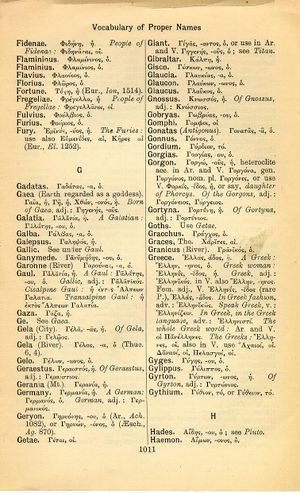Getae: Difference between revisions
οὐκ ἐπιθυμήσεις τὴν γυναῖκα τοῦ πλησίον σου → thou shalt not covet thy neighbor's wife, thou shalt not covet thy neighbour's wife, you shall not covet your neighbor's wife, you shall not covet your neighbour's wife
(Names) |
(6_7) |
||
| Line 1: | Line 1: | ||
{{WoodhouseENELnames | {{WoodhouseENELnames | ||
|Text=[[File:woodhouse_1011.jpg|thumb|link={{filepath:woodhouse_1011.jpg}}]]Γέται, οἱ. | |Text=[[File:woodhouse_1011.jpg|thumb|link={{filepath:woodhouse_1011.jpg}}]]Γέται, οἱ. | ||
}} | |||
{{Lewis | |||
|lshtext=<b>Gĕtae</b>: ārum, m., = Γέται,<br /><b>I</b> a Thracian [[tribe]] on the [[Danube]], [[bordering]] on the Dacians, the Getœ, Cic. Att. 9, 10, 3; Mel. 2, 2, 3; Plin. 4, 11, 18, § 41; 4, 12, 25, § 80; Cic. Att. 9, 10, 3; Verg. G. 3, 462; Ov. P. 3, 4, 92; Hor. C. 3, 24, 11; 4, 15, 22.—In <[[number]] opt="n">[[sing]].</[[number]]>: Gĕta, ae, m., a Getan, Ov. P. 1, 8, 6; Sen. Hippol. 167; in the Gr. form, Gĕtes, ae, Ov. P. 1, 2, 108; 2, 1, 66; Luc. 2, 54 al.—<br /> <b>B</b> Transf.: Gĕta, ae, m., a Roman [[surname]]; as C. [[Licinius]] Geta, [[consul]] A. U. C. 638, [[censor]] 646, Cic. Clu. 42, 119; and Geta, [[brother]] and coregent of the [[emperor]] Caracalla, Spart. Ant. Geta, 1 sqq. Also the [[name]] of a Greek [[slave]], Ter. Ad. and Phorm.—<br /><b>II</b> Derivv.<br /> <b>A</b> Gĕtes, ae, adj. m., of or belonging to the Getœ, Getan: poëta, Ov. P. 4, 13, 17: [[Hebrus]], Sen. Herc. Oet. 1041.—<br /> <b>B</b> Gĕtĭcus, a, um, adj., Getan, in [[poet]]. transf. also for Thracian: [[gens]], Ov. Tr. 5, 7, 13: [[arma]], id. P. 2, 8, 69; [[hence]] also: [[maritus]] Veneris (i.e. [[Mars]]), Stat. S. 1, 2, 53: [[sermo]], Ov. P. 4, 13, 19: [[lyra]], i. e. of the Thracian [[Orpheus]], Stat. S. 3, 1, 17; cf. [[plectrum]], id. ib. 2, 2, 61: volucres, i. e. the swallows ([[because]] [[Progne]], [[wife]] of the Thracian [[king]] [[Tereus]], [[was]] changed [[into]] a [[swallow]]), id. Th. 12, 478: ([[aqua]]) frigidior Geticis pruinis, Juv. 5, 50—Adv.: Gĕtĭce, [[like]] the Getœ: loqui, Ov. Tr. 5, 12, 58. | |||
}} | }} | ||
Revision as of 08:09, 13 August 2017
English > Greek (Woodhouse)
Γέται, οἱ.
Latin > English (Lewis & Short)
Gĕtae: ārum, m., = Γέται,
I a Thracian tribe on the Danube, bordering on the Dacians, the Getœ, Cic. Att. 9, 10, 3; Mel. 2, 2, 3; Plin. 4, 11, 18, § 41; 4, 12, 25, § 80; Cic. Att. 9, 10, 3; Verg. G. 3, 462; Ov. P. 3, 4, 92; Hor. C. 3, 24, 11; 4, 15, 22.—In <number opt="n">sing.</number>: Gĕta, ae, m., a Getan, Ov. P. 1, 8, 6; Sen. Hippol. 167; in the Gr. form, Gĕtes, ae, Ov. P. 1, 2, 108; 2, 1, 66; Luc. 2, 54 al.—
B Transf.: Gĕta, ae, m., a Roman surname; as C. Licinius Geta, consul A. U. C. 638, censor 646, Cic. Clu. 42, 119; and Geta, brother and coregent of the emperor Caracalla, Spart. Ant. Geta, 1 sqq. Also the name of a Greek slave, Ter. Ad. and Phorm.—
II Derivv.
A Gĕtes, ae, adj. m., of or belonging to the Getœ, Getan: poëta, Ov. P. 4, 13, 17: Hebrus, Sen. Herc. Oet. 1041.—
B Gĕtĭcus, a, um, adj., Getan, in poet. transf. also for Thracian: gens, Ov. Tr. 5, 7, 13: arma, id. P. 2, 8, 69; hence also: maritus Veneris (i.e. Mars), Stat. S. 1, 2, 53: sermo, Ov. P. 4, 13, 19: lyra, i. e. of the Thracian Orpheus, Stat. S. 3, 1, 17; cf. plectrum, id. ib. 2, 2, 61: volucres, i. e. the swallows (because Progne, wife of the Thracian king Tereus, was changed into a swallow), id. Th. 12, 478: (aqua) frigidior Geticis pruinis, Juv. 5, 50—Adv.: Gĕtĭce, like the Getœ: loqui, Ov. Tr. 5, 12, 58.

